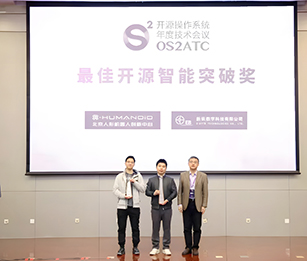Beijing E-Town's groundbreaking robot dataset wins prestigious awards

At the 12th Open Source Operating System Annual Technical Conference (OS2ATC) held in Beijing, the Beijing Humanoid Robot Innovation Center at Beijing E-Town, was awarded the "Best Open Source Intelligent Breakthrough Award" for the nation's first universal embodied intelligent dataset, RoboMIND. This marks a new stage in global robot operating system research driven by data.
The core breakthrough of this dataset lies in the pioneering construction of a standardized, scalable, and diversified robot operation data system.
During the development process, the Beijing humanoid robot technology team collaborated with institutions such as Peking University for joint innovation. Through the use of a self-developed intelligent data collection platform, they invested in a 2,000-square-meter experimental site and over 100,000 person-hours, assembling a professional team covering various disciplines including robotics, computer vision, and natural language processing. They successfully overcame the technical challenges of compatibility with data from multiple robot configurations.
Currently, the dataset contains 107,000 high-quality operation trajectories, encompassing 479 task scenarios and 96 types of object interactions. It is expected to expand to 300,000 trajectories by the end of the year.
RoboMIND dataset has achieved three major breakthroughs in technical innovation, including the precise annotation of over 10,000 frames, the establishment of a mechanism for learning from failures within the dataset, and a high-fidelity digital twin environment.
In terms of data standards, the RoboMIND dataset has constructed a comprehensive standardized system, providing high-quality benchmark data resources for embodied intelligence research.
Currently, the RoboMIND dataset has had a profound impact globally. Over a hundred top research institutions and companies have used it as a benchmark dataset for algorithm development. This dataset not only addresses the long-standing issue of data scarcity in the field of robot learning but also significantly reduces the research threshold and drives the rapid development of the entire field through standardized data formats and a complete tool chain.


